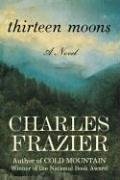Written in the first person, the author traces the life of Will Cooper starting with the time he was bonded at age 12 through ninety-something. The story begins and ends with Will sitting alone ruminating on his life. In between is an eloquently written story that take the reader into the not so glory days of early America.
Frazier writes with an eye to detail that puts the reader in the scene. Whether he is describing the density of a mountain forest, a night of dance in a Cherokee townhouse, or a lover's tryst the reader is a participant. Emotions are so vividly drawn that I felt them along with the characters.
This is a powerful story. I give it ****.
Thirteen Moons (2006) by Charles Frazier is his third book and its another beauty. When 12-year-old Will Cooper is sent off on his own to be an indentured servant running a trading post on the border of the Cherokee Nation, it sets him on a lifelong journey searching for his place in the world and somewhere to call home. He is adopted by a Cherokee chief, Bear, falls in love, wins and loses fortunes, endures the Civil War and meets the likes of Davy Crockett and Andrew Jackson. Fraziers books are so beautifully rendered that the images of the places he writes about stay with you long after the reading of them.
This is a story of the life of Will Cooper, as told by himself, at the time period of the forced relocations of the Native Americans in the US.
My favorite thing about this book is Frazier's prose, very poetic, always thought provoking, yet easy to read.
I appreciate books that are real and convincing, not cliche and fake, and Frazier is definitely a writer of the first kind. I can't put into words how convincing he was, for example when writing the main character's thoughts on aging. He made me understand what the weariness of growing old really feels like, and I wonder how someone who wasn't yet sixty could have written so realistic a view on this issue. This is just one of the many descriptions in this book that made me wonder how he created such realistic feelings when he could not have experienced it himself. Another is his telling of what it was like in the Indians' townhouses during their parties.
I really enjoyed the book but have to admit the middle part was difficult to read at times, just because of the gruesome mistreatment of the Indians and the matter-of-fact descriptions in some death scenes.
This story revealed a seemingly legendary man to be a faulty human, completely honest in his reflections. And he is forever in love with a girl/woman who is frustratingly aloof about their relationship.
I would read it again just to listen to the poetry of the story. Beautiful writing.
Well written novel about a very old man who looks back on a remarkable life. Hired out as an orphan, and adopted by Cherokees, he became a backwoods lawyer who fought for Native American property rights. Enjoyable, but I liked the author's Cold Mountain better.
Very good historical fiction.
There's a lot to like in âThirteen Moons'. First, probably, is the incredible job Frazier does in describing the hardwood forest environment of the Cherokee Territory that encompassed 140,000 square miles over land that later became parts of North Carolina, Tennessee, South Carolina, Georgia, and Alabama. When Will Cooper rides through this wild and beautiful landscape, the reader is right there with him, whether admiring it or struggling to survive in it.
Frazier also uses vocabulary that may have the reader searching through obscure word lists â the first sentence of the book declares that âthere is no scatheless raptureâ â but which continually conjures believable vocabulary and language usage of the post-Revolutionary, pre-Western expansion period of U.S. history.
And the background upon which he has placed this fictional memoir is one of the saddest and perhaps most misunderstood events in the clashes between European settlers and the native inhabitants â the dissolution of the Cherokee Territory and the forced relocation of its inhabitants to what eventually became Oklahoma, along the Trail of Tears (which Frazier accurately renders as âthe trail where they criedâ. Like any vibrant and living culture, that of the Cherokee was not monolithic. There were multiple factions and wildly varying responses to the nascent United States' demands; while Frazier doesn't go into great detail (the book would have been 1400 pages instead of 400 if he had done so), he spends enough time on it to get the job done. The job being to portray the attempts of his main character to help his adopted clan stay in their ancestral home.
Less satisfying is the character development of two of the main characters in the book â Claire, the woman Will loves, and the morally ambiguous Featherstone, whose presence in Claire's life makes the budding romance between her and Will tenuous at best and impossible at worst. The problem is that we really never quite understand why Will seems to continue to respect Featherstone; why he doesn't take what would appear to be the logical action when their conflict erupts into the open. Nor are we ever made privy to the reasons Claire keeps walking away from Will,
These problems keep the book from being truly remarkable; even with them, it is a rich and satisfying read.





